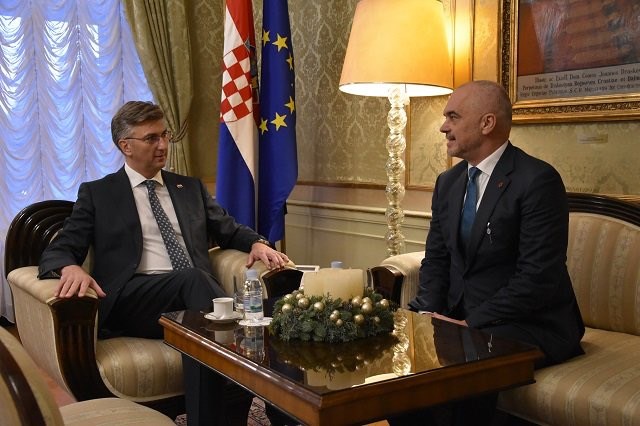- Published: 05.12.2018.
Plenkovic says Albania's EU entry talks likely to start after EU elections
Croatian Prime Minister Andrej Plenkovic met with Albanian PM Edi Rama on Tuesday, saying afterwards that Albania's European Union accession negotiations could be opened after the European elections in May and that Zagreb would firmly stand by Tirana in that process.
"Our belief is that, after the European elections, a consensus will be reached on formally opening the accession negotiations and Croatia will support that process with Albania very firmly," Plenkovic said after meeting with Rama as part of a Central European Initiative (CEI) summit in Zagreb.
He said that at the meeting Croatia once again expressed strong support for Albania in its ambition to join the EU, notably for its embarking on formal accession negotiations now that its legislation was being screened.
"Croatia will continue to strongly support our friends also within the Council of the EU and try to have the pace of that process reflect the meeting of the criteria and Albania's individual achievements," Plenkovic said, voicing Croatia's willingness to "share the knowledge and experience of Croatian experts."
He said that for Albania and Macedonia it was crucial to begin with intergovernmental conferences and to open the accession negotiations. He said conclusions from June showed that 2018 was the year in which the two countries were becoming acquainted with the EU acquis communautaire.
Rama said Albania and Croatia traditionally had good relations but that they had been growing stronger since Croatia gained independence. "I thank Croatia for the unreserved support to Albania, but also regarding the recognition of Kosovo and our NATO membership."
He went on to say that "from the beginning of Croatia's birth, Albania has always been there for its friend and Croatia has always been there for Albania."
He said the statement on strategic partnership between the two countries signed today gave new impetus to Albania-Croatia relations. "We also talked about the further development of economic relations and agreed to organise an economic forum next year."
PM Plenkovic also commented on the strategic partnership statement, which, he said, "additionally strengthens our cooperation" and expressed confidence that the agreement would promote trade between the two countries, which currently amounts to more than EUR 60 million.
"We want our cooperation to proceed within various trilateral and quadrilateral formats in Southeast Europe, notably as regards the Adriatic-Ionian corridor as well as the Adriatic-Ionian gas pipeline, which is a project that is interesting to both countries," said Plenkovic.
He also mentioned the Albanian minority in Croatia, saying that Croatia "appreciates very much the Albanian minority's contribution to its society."
Asked about the strained relations between Serbia and Kosovo and Belgrade's accusations about an attempt to create a Great Albania, Rama recalled that Serbia had violated the Central European Free Trade Agreement (CEFTA), that Kosovo had complained about it but that there was no response on the other side.
He did admit that Kosovo's increasing customs duties on imports from Serbia by 100% was not normal, but noted that the current situation was not normal either.
Under normal circumstances, this would be a problem, said Rama.
As for accusations about a Great Albania, he said that they always appeared when Kosovo Albanians rightfully asked for something and when Albania and Kosovo discussed matters of common interest.
PM Plenkovic said that Croatia wanted good relations with everyone - Albania, Kosovo and Serbia.
"We want relations to normalise and stabilise, and that is what Enlargement Commissioner Johannes Hahn spoke about today," said Plenkovic.
Rama, a former basketball player, visited Zagreb's Drazen Petrovic Museum, stressing that Albania had always rooted for Croatia, including during the FIFA World Cup in Russia.
The meeting between Plenkovic and Rama was the last of numerous bilateral meetings held as part of the CEI summit with which Croatia ended its presidency of the initiative, established nearly 30 years ago.
The next CEI chair is Italy.
Text: Hina
